
According to the results of a survey conducted by Active Group and Experts Club in August 2025, Ukrainians tend to have a positive attitude toward Israel.
Thus, 44.7% of respondents expressed sympathy for this country (32.7% — mostly positive, 12% — completely positive). Negative assessments accounted for 13.7%, another 40% remained neutral, and 1.7% admitted that they did not know enough about Israel.
“Despite a certain percentage of criticism, Ukrainians’ attitude toward Israel remains generally positive. This is explained by both historical ties and cooperation in the fields of medicine, science, and military technology,” commented Active Group CEO Oleksandr Pozniy.
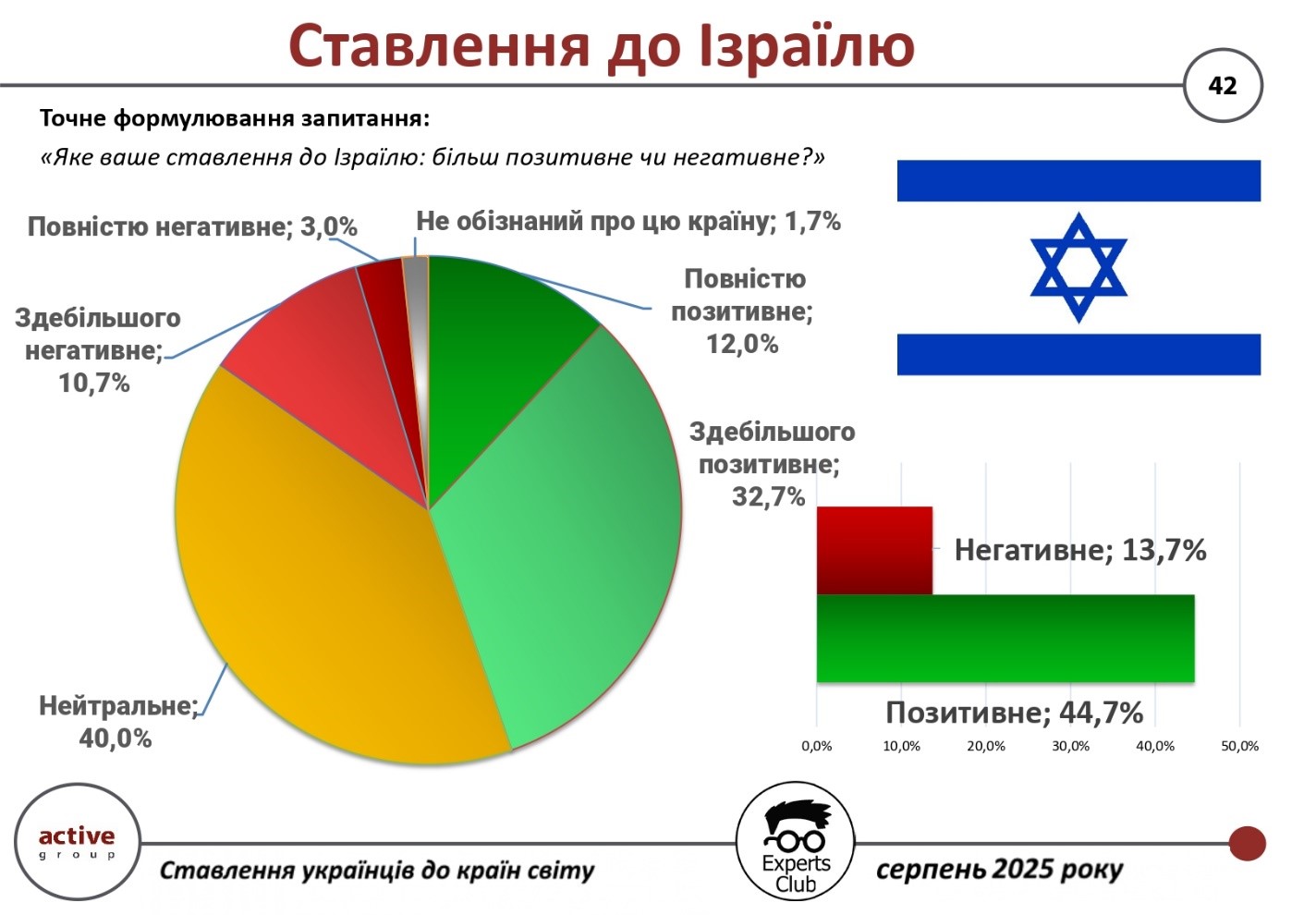
In turn, Maksim Urakin, co-founder of Experts Club, drew attention to the trade and economic component:
“At the end of 2025, bilateral trade between Ukraine and Israel amounted to more than $353 million. Ukrainian exports amounted to $132.4 million, while imports of Israeli goods exceeded $221 million. This led to a negative balance of about $88.6 million. Such an imbalance indicates the need to expand Ukrainian exports and search for new niches in the Israeli market,” he stressed.
Thus, Ukrainians’ attitude toward Israel is moderately positive, but economic indicators show challenges that should be taken into account in bilateral relations.
The full video can be viewed at: https://www.youtube.com/watch?v=YgC9TPnMoMI&t
You can subscribe to the Experts Club YouTube channel here: https://www.youtube.com/@ExpertsClub
ACTIVE GROUP, EXPERTS CLUB, ISRAEL, Pozniy, SOCIOLOGY, TRADE, UKRAINE, URAKIN

In January-June 2025, the logistics company TAS-Logistic LLC reduced its revenue by 4.7 times compared to the same period last year, to UAH 91.14 million.
According to a report in the disclosure system of the National Securities and Stock Market Commission, the company’s net loss amounted to UAH 89.04 million, compared to a net profit of UAH 89.50 million in the first half of 2024.
It is noted that the gross loss for January-June this year amounted to UAH 26.17 million, while for the same period in 2024, a gross profit of UAH 310.68 million was recorded.
The operating loss for the first half of 2025 amounted to UAH 32.00 million, compared to UAH 224.44 million in operating profit for the first half of 2024.
During the reporting period, the company managed to reduce long-term bank loans from UAH 264.4 million to UAH 220.8 million, other long-term liabilities from UAH 471.7 million to UAH 415.5 million, while current accounts payable on long-term liabilities increased from UAH 181.8 million to UAH 229.8 million, and other current liabilities from UAH 225.4 million to UAH 313.7 million.
TAS-Logistic is part of the TAS group, owned by Serhiy Tihipko. The company provides a full range of transport and logistics services for the transportation of grain and oilseeds, as well as sea transportation of import and export cargo through the main seaports of Ukraine and Europe with full logistics support.
The company’s fleet includes more than 1,700 grain cars and 160 semi-cars, 161 flatcars, and 52 tank cars.
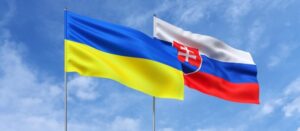
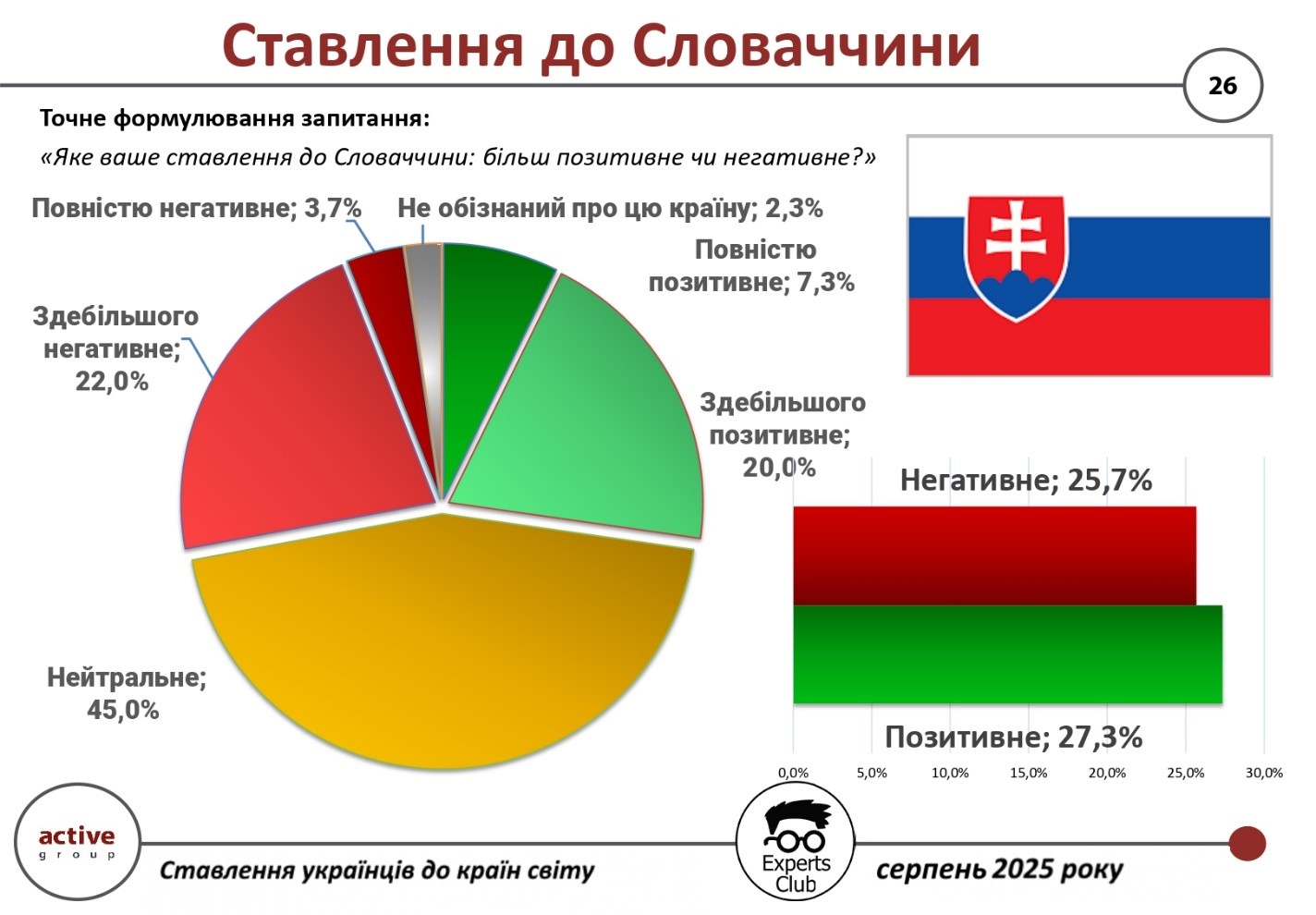
A sociological survey conducted by Active Group in cooperation with the Experts Club think tank in August 2025 showed that Ukrainians’ attitudes toward Slovakia are quite controversial.
According to the results, 27.3% of respondents demonstrated a positive attitude toward this country (20.0% – mostly positive, 7.3% – completely positive). At the same time, 25.7% of Ukrainians expressed a negative opinion (22.0% – mostly negative, 3.7% – completely negative). A significant part of citizens – 45.0% – remain neutral, and another 2.3% said they do not have enough information about Slovakia.
“We observe a kind of balance between positive and negative perceptions of Slovakia. On the one hand, there is historical and geographical proximity, cultural contacts, and on the other hand, tense moments in the political dialogue in recent years. This creates an ambiguous picture,” explained Oleksandr Poznyi, co-founder of Active Group.
In his turn, Maksym Urakin, founder of Experts Club, drew attention to the economic dimension of bilateral relations.
“In the first half of 2025, the trade turnover between Ukraine and Slovakia amounted to more than $1.48 billion. At the same time, exports from Ukraine amounted to $483.7 million, while imports from Slovakia amounted to almost $999.1 million. The negative balance of more than $515 million indicates an imbalance in trade, which also affects the public perception of the country,” he emphasized.
The survey was part of a broader study of international sympathies and antipathies of Ukrainians in the current geopolitical context.
The full video can be viewed here:
https://www.youtube.com/watch?v=YgC9TPnMoMI&t
You can subscribe to the Experts Club YouTube channel here:
https://www.youtube.com/@ExpertsClub
ACTIVE GROUP, DIPLOMACY, EXPERTS CLUB, Poznyi, SLOVAKIA, SOCIOLOGY, TRADE, URAKIN

Most Ukrainians have a positive opinion of Azerbaijan, according to the results of a survey conducted by Active Group in collaboration with the Experts Club think tank.
According to the study, 56.7% of Ukrainians expressed a positive attitude toward Azerbaijan, of which 15.3% were completely positive and 41.3% were mostly positive. Only 5.7% of respondents expressed a negative attitude (1.0% completely negative, 4.7% mostly negative). A neutral position was taken by 36.3% of respondents, while another 1.3% said they were not familiar with the country.
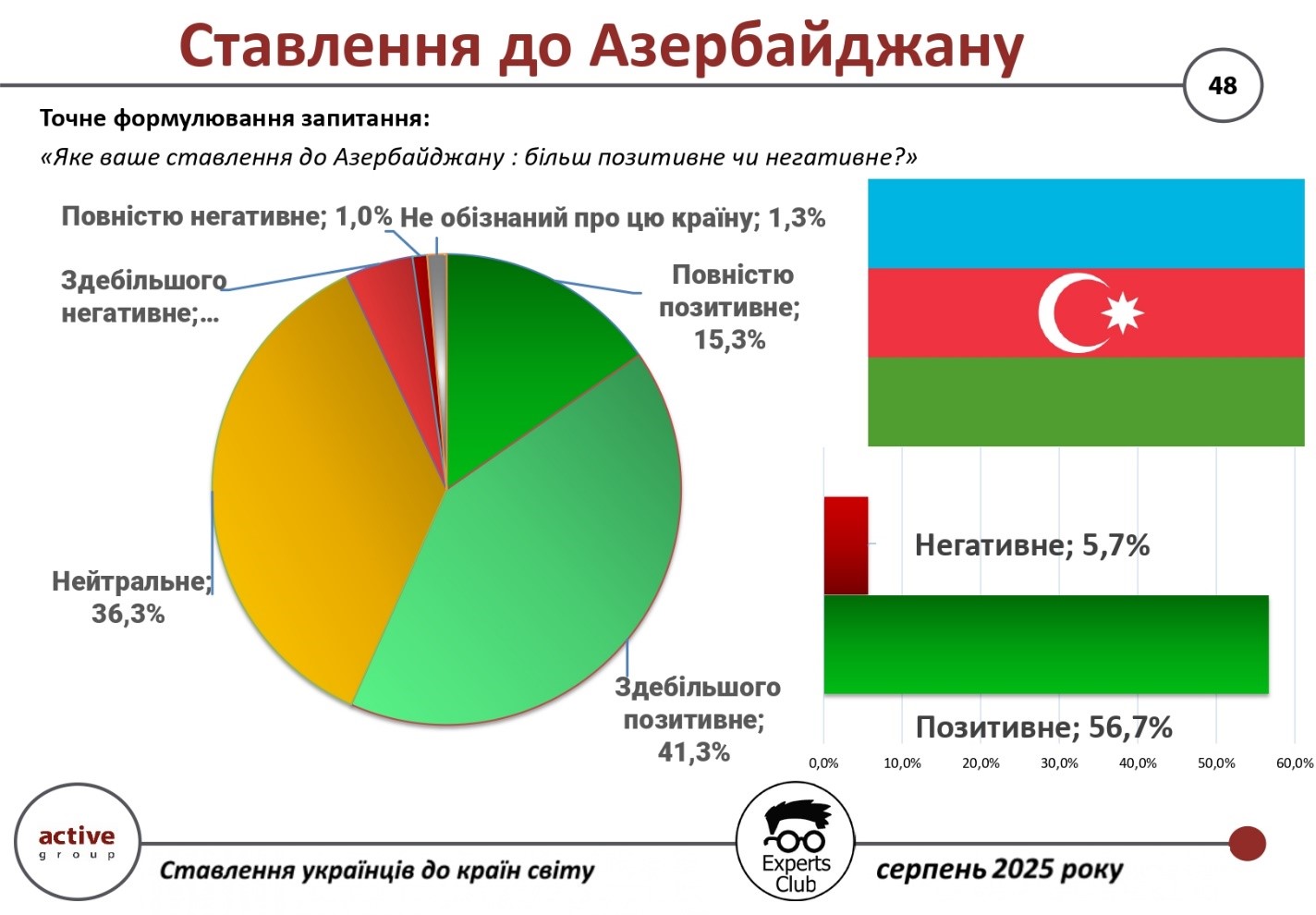
“Ukrainians have a favorable attitude toward Azerbaijan, given the close cultural and historical ties, as well as active cooperation in the energy and transport sectors,” emphasized Alexander Pozniy, head of Active Group.
In turn, Experts Club co-founder Maxim Urakin stressed the importance of trade and economic cooperation, which has continued to develop rapidly in recent years.
“According to the results of the first months of 2025, trade turnover between Ukraine and Azerbaijan amounted to $237.9 million. Ukrainian exports reached $110.3 million, while imports amounted to $127.6 million. The negative balance amounted to $17.3 million, which is relatively small compared to other countries, but confirms the activity of mutual trade flows.”
Thus, Azerbaijan remains a reliable partner of Ukraine in both social and economic terms, and the level of trust among Ukrainians remains high.
The full video can be viewed at: https://www.youtube.com/watch?v=YgC9TPnMoMI&t
You can subscribe to the Experts Club YouTube channel here: https://www.youtube.com/@ExpertsClub
ACTIVE GROUP, AZERBAIJAN, EXPERTS CLUB, Pozniy, SOCIOLOGY, TRADE, UKRAINE, УРАКИН

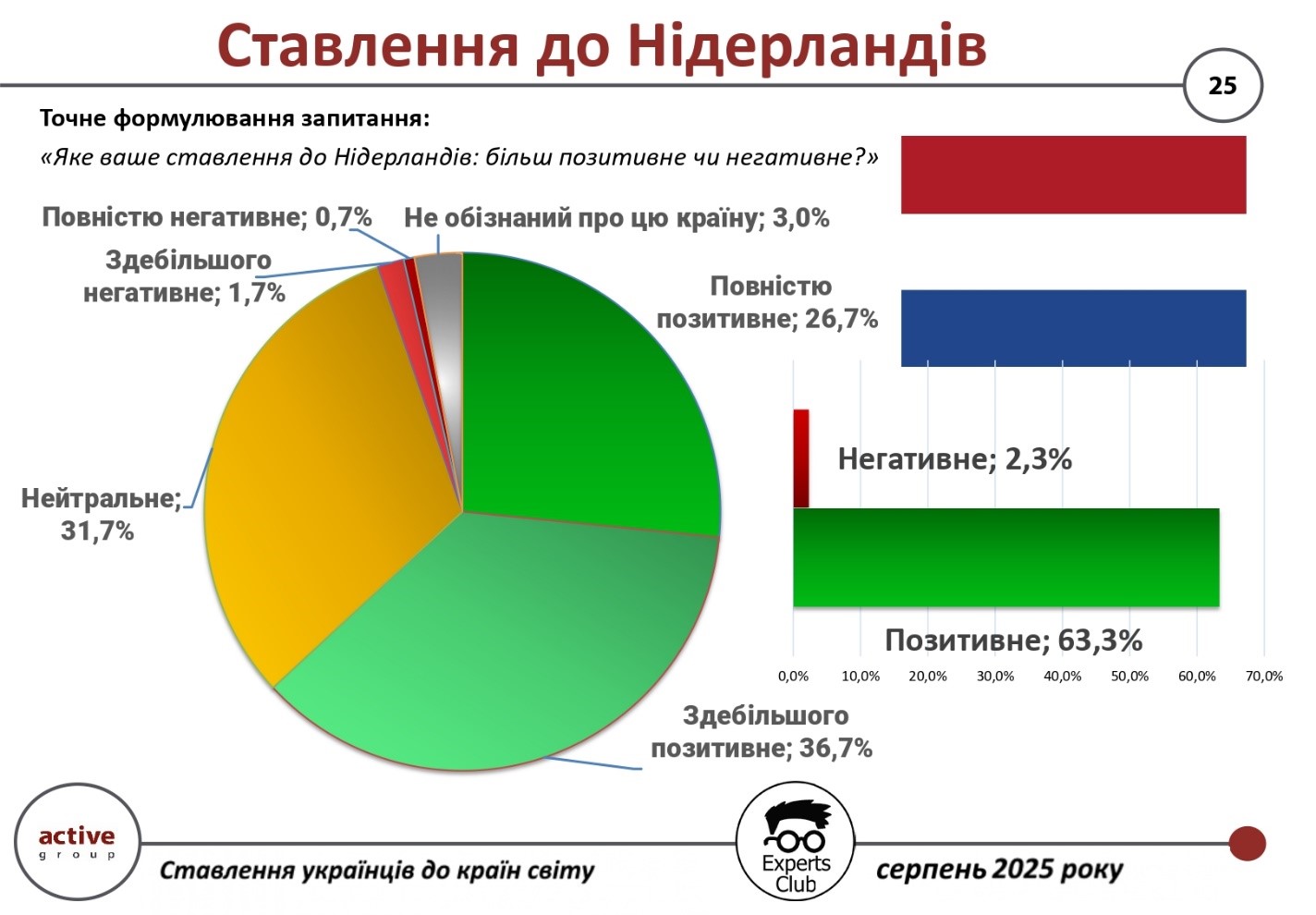
The Netherlands ranks high in the rating of Ukrainians’ sympathies, demonstrating a consistently positive image among citizens. This is evidenced by the results of an all-Ukrainian survey conducted by Active Group in cooperation with the Experts Club information and analytical center in August 2025.
According to the study, 63.3% of Ukrainians have a positive attitude towards the Netherlands (36.7% – mostly positive, 26.7% – completely positive). Only 2.3% of respondents expressed a negative attitude (1.7% – mostly negative, 0.7% – completely negative). Another 31.7% of citizens are neutral, and 3.0% said they are not sufficiently aware of this country.
“The Netherlands is one of Ukraine’s most important trading partners in the European Union. In the first half of 2025, the volume of bilateral trade amounted to almost $ 1.48 billion, of which exports from Ukraine amounted to more than $ 918 million and imports from the Netherlands – $ 561 million. The positive balance of $357 million is evidence that Ukraine has favorable positions in cooperation with this country,” said Maksym Urakin, founder of Experts Club.
In his turn, Alexander Poznyi, co-founder of Active Group, emphasized that the positive attitude of Ukrainians is complex.
“The Netherlands is known as a country that supports Ukraine in the international arena and participates in humanitarian and financial assistance programs. At the same time, long-term cultural and educational contacts strengthen the positive image of this country in Ukrainian society. That is why almost two-thirds of citizens show favorable attitudes, and the negative segment remains minimal,” he added.
The survey was part of a broader study of international sympathies and antipathies of Ukrainians in the current geopolitical environment.
The full video can be viewed here:
https://www.youtube.com/watch?v=YgC9TPnMoMI&t
You can subscribe to the Experts Club YouTube channel here:
https://www.youtube.com/@ExpertsClub
ACTIVE GROUP, DIPLOMACY, EXPERTS CLUB, NETHERLANDS, Poznyi, SOCIOLOGY, TRADE, URAKIN

The week on the cryptocurrency markets was marked by cautious optimism: Bitcoin strengthened, Ethereum and altcoins are preparing for potential growth, and key events – Fed rates, regulatory updates, and token lock-up volumes – are setting the tone for the second half of September.
Bitcoin rose 8% in September and is on track to have its best September in 13 years.
The total capitalization of the cryptocurrency market stabilized at around $4.05 trillion.
Bitcoin’s dominance has declined slightly, giving altcoins room to shine.
Ethereum and other major altcoins are showing the best growth rates in recent months; ETH has outperformed Bitcoin over the last third of the summer.
Bitcoin and ETH trading volumes have declined slightly, indicating market participants’ expectations ahead of major decisive events and regulatory decisions.
Forecasts and familiar themes for the second half of September from Fixygen:
Market participants expect another rate cut in the US, which could stimulate growth in “risky” assets, including cryptocurrencies.
Since Bitcoin is not so clearly in the lead, investors are likely to flow into altcoins — especially projects with real utility or new upgrades/token burns.
Simplified rules for listing ETF products and relaxed regulations could all increase the inflow of institutional capital.
There could be sharp pullbacks, especially if the macroeconomy unexpectedly deteriorates: inflation, unstable geopolitics, or regulatory overreach. Support from key levels (strong resistance/support) will be critical.
Close attention should be paid to events related to token unlocks and network protocol updates (e.g., throughput increases, staking income increases). These events could drive short-term interest in the market.
Source: https://www.fixygen.ua/news/20250919/pidsumki-tizhnya-dlya-kriptovalyut-oglyad-fixygen.html